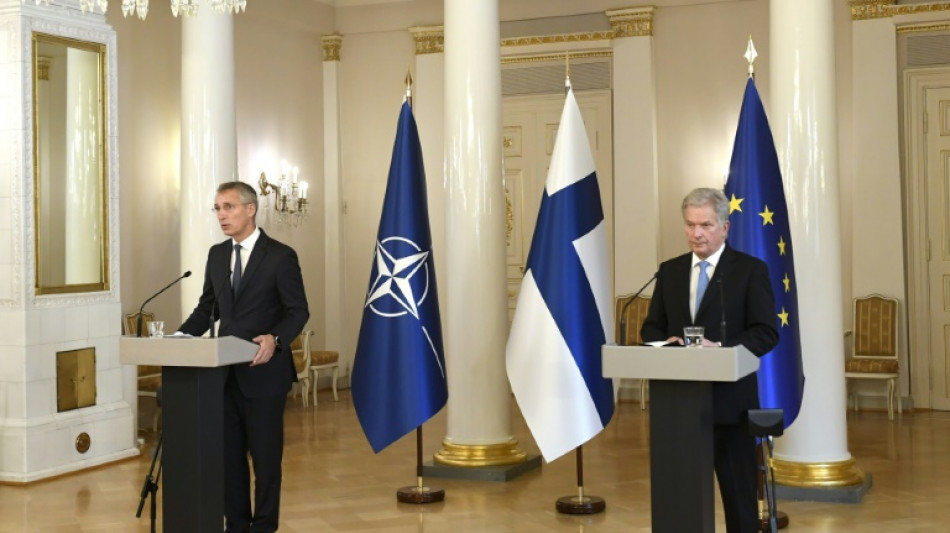
-
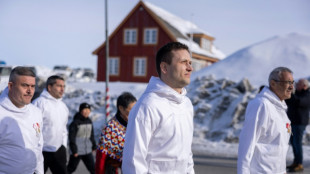 Greenland PM visits Denmark as Trump threats loom
Greenland PM visits Denmark as Trump threats loom
-
Philippines, US test air defences as China seizes reef
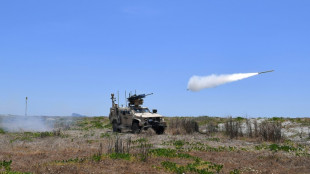
-
 25 killed, fires still burning in huge Iran port blast
25 killed, fires still burning in huge Iran port blast
-
India and Pakistan troops exchange fire in Kashmir
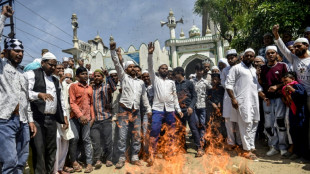
-
 Eighteen killed, fires still burning in huge Iran port blast
Eighteen killed, fires still burning in huge Iran port blast
-
No handshake at muted India-Pakistan border ceremony

-
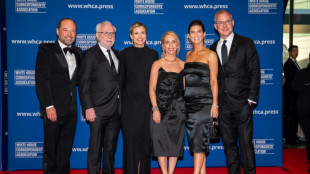 Maligned by Trump, White House reporters hold subdued annual gala
Maligned by Trump, White House reporters hold subdued annual gala
-
Austria trials DNA testing to uncover honey fraud

-
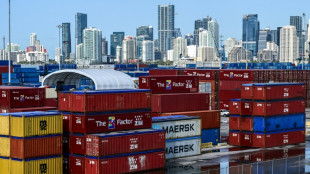 Trump trade war pushes firms to consider stockpiling
Trump trade war pushes firms to consider stockpiling
-
D'Backs' Suarez becomes 19th MLB player to hit four homers in one game

-
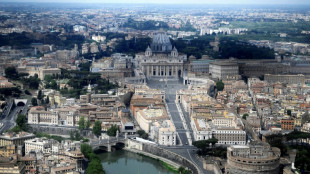 Continuity or rupture: what direction for the next pope?
Continuity or rupture: what direction for the next pope?
-
Surridge scores four as Nashville smash seven past Chicago
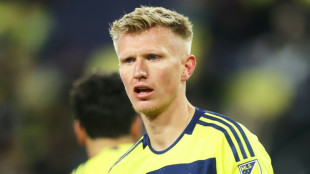
-
 Chinese tea hub branches into coffee as tastes change
Chinese tea hub branches into coffee as tastes change
-
Diplomacy likely to trump geography in choice of new pope
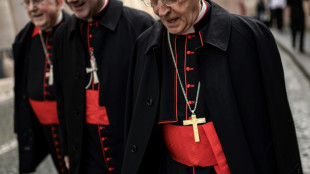
-
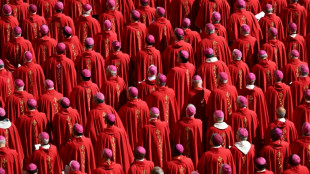 All eyes turn to conclave after Pope Francis's funeral
All eyes turn to conclave after Pope Francis's funeral
-
Doves, deaths and rations: Papal elections over time
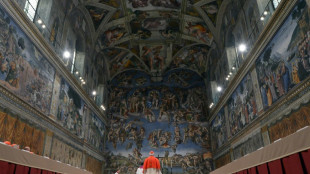
-
 Progressive Canadians say social issues blown off election agenda
Progressive Canadians say social issues blown off election agenda
-
Liverpool primed for Premier League title party

-
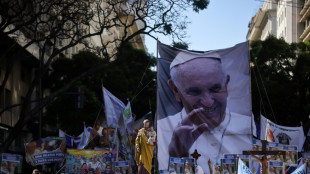 Buenos Aires bids farewell to Francis with tears, calls to action
Buenos Aires bids farewell to Francis with tears, calls to action
-
Thunder sweep past Grizzlies in NBA playoffs, Cavs on brink
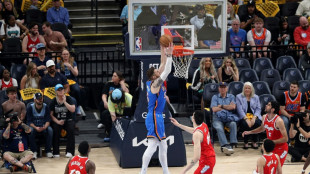
-
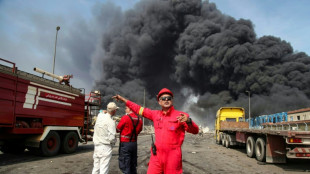 Major blast at Iran port kills 14, injures 750
Major blast at Iran port kills 14, injures 750
-
'What we live for': Kounde after winning Barca Copa del Rey final
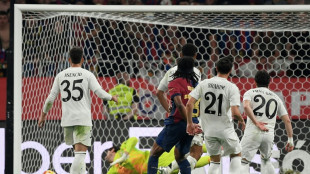
-
 More McIlroy magic at PGA pairs event but Novak and Griffin lead
More McIlroy magic at PGA pairs event but Novak and Griffin lead
-
Fire rages after major blast at Iran port kills 14, injures 750
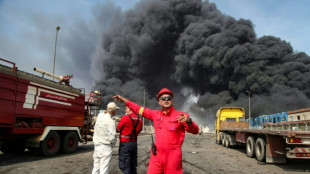
-
 Denkey wonder-strike keeps Cincinnati on track in MLS
Denkey wonder-strike keeps Cincinnati on track in MLS
-
Barca edge Real Madrid in extra-time to win wild Copa del Rey final

-
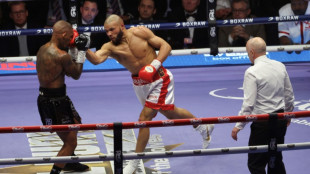 'Legendary' Eubank Jr beats Benn in grudge bout
'Legendary' Eubank Jr beats Benn in grudge bout
-
Thunder sweep past Grizzlies into NBA playoffs 2nd round, Cavs on brink
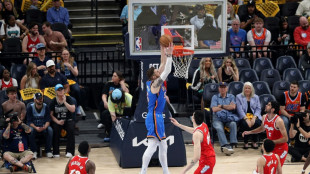
-
 South Korea's Ryu and Japan's Saigo share LPGA Chevron lead
South Korea's Ryu and Japan's Saigo share LPGA Chevron lead
-
Canada leaders make closing pitches in campaign upended by Trump

-
 De Bruyne's Man City exit 'so difficult' for Guardiola
De Bruyne's Man City exit 'so difficult' for Guardiola
-
'No regrets' for Amorim over Man Utd move

-
 Lyon and Strasbourg win to close in on Europe, Montpellier relegated from Ligue 1
Lyon and Strasbourg win to close in on Europe, Montpellier relegated from Ligue 1
-
Toulouse thrash Castres as Top 14 pursuers stumble

-
 Djokovic crashes to nervous Arnaldi in Madrid opener, Swiatek advances
Djokovic crashes to nervous Arnaldi in Madrid opener, Swiatek advances
-
Olympic champs Russell, Davis-Woodhall win at Drake Relays

-
 Browns end Sanders long draft slide
Browns end Sanders long draft slide
-
Cavs crush Heat, on brink of NBA playoff sweep

-
 Fire rages after major blast at Iran port kills 8, injures hundreds
Fire rages after major blast at Iran port kills 8, injures hundreds
-
Kiwi Beamish wins Penn Relays 1,500m crown with late kick

-
 Mbappe on Real Madrid bench for Clasico Copa del Rey final
Mbappe on Real Madrid bench for Clasico Copa del Rey final
-
England survive France fightback to seal Women's 6 Nations slam

-
 Palace sweep past Villa to reach FA Cup final
Palace sweep past Villa to reach FA Cup final
-
CAF appoint Moroccan Lekjaa first vice-president

-
 Major blast at Iran port kills 5, injures hundreds
Major blast at Iran port kills 5, injures hundreds
-
Rodgers vows to stay with Celtic after fourth successive Scottish title

-
 Ipswich relegated as Newcastle, Chelsea boost top five bids
Ipswich relegated as Newcastle, Chelsea boost top five bids
-
Canada leaders make final pitches in campaign upended by Trump

-
 Mullins -- Ireland's national training treasure
Mullins -- Ireland's national training treasure
-
US, Iran say progress in 'positive' nuclear talks


Finnish MPs open debate on joining NATO
Finland's parliament Wednesday will open a debate on whether to seek NATO membership, after Russia's invasion of Ukraine sparked a surge in political and public support for joining the military alliance.
Despite Russia warning of a nuclear build-up in the Baltic should Finland and neighbouring Sweden join the military alliance, Finland's prime minister said that her country would now decide quickly on whether to apply for membership.
"I think it will happen quite fast. Within weeks, not within months," Prime Minister Sanna Marin said last week.
Sweden is also discussing whether to submit a membership bid following Russia's February 24 invasion.
The 200 MPs in Finland's Eduskunta last week received a government-commissioned "white paper" that assessed the implications of NATO membership alongside other security options, such as increased bilateral defence agreements.
The report did not make recommendations but stressed that without NATO membership, Finland enjoys no security guarantees despite currently being a partner to the alliance.
It said the "deterrent effect" on Finland's defence would be "considerably greater" inside the bloc, while noting that membership also carried obligations for Finland to assist other NATO states.
After two decades of public support for NATO membership remaining steady at 20-30 percent, the war sparked a surge among those in favour to over 60 percent, according to opinion polls.
"I used to be against joining NATO but because of this situation I'm now more in favour," said 24-year-old Sofia Lindblom, walking her dog in central Helsinki on Wednesday.
"Joining would bring a certain kind of security," she told AFP.
On nearby Senate Square, Vuokka Mustonen said the invasion of Ukraine has "utterly changed" her opinion in favour of NATO membership.
"I feel pretty safe, but quite worried," the 69-year-old said.
- 'Highly likely' -
Public statements gathered by Finnish media suggest half of Finland's 200 MPs now support membership, while only around 12 oppose.
Others say they will announce a position after detailed discussions.
The Finnish government said it hopes to build a parliamentary consensus over the coming weeks, with MPs due to hear from a number of security experts.
On Saturday, Finland's European Affairs Minister Tytti Tuppurainen said she believed a Finnish application was "highly likely."
"But the decision is not yet made," she told Britain's Sky News.
However, the Finns "seem to have already made up their mind and there is a huge majority for the NATO membership."
Many analysts predict Finland could submit a bid in time for a NATO summit in June.
Any membership bid must be accepted by all 30 NATO states, a process that could take four months to a year.
Finland has so far received public assurances from Secretary General Jens Stoltenberg that NATO's door remains open, and support from several members.
President Sauli Niinisto said Russia's response could include airspace, territorial violations and hybrid attacks, which Finnish NATO proponents believe the country is well prepared to withstand.
Finland declared independence in 1917 after 150 years of Russian rule.
During World War II, its vastly outnumbered army fought off a Soviet invasion, before a peace deal saw it cede several border areas to Moscow.
The Nordic nation remained neutral during the Cold War in exchange for Soviet guarantees not to invade.
After the fall of the Iron Curtain, Finland firmly aligned itself with the West, by joining the EU and becoming a close partner of NATO.
Successive Finnish leaders shied away from full membership believing that military non-alignment was the best way to maintain working relations with the Kremlin.
A.Jones--AMWN